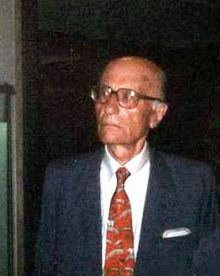Indro Montanelli
| Indro Montanelli | |
|---|---|

Indro Montanelli in 1992.
|
|
| Born |
Indro Alessandro Raffaello Schizogene Montanelli 22 April 1909 Fucecchio, Italy |
| Died | 22 July 2001 (aged 92) Milan, Italy |
| Nationality | Italian |
| Other names | "Cilindro" ("Top Hat") |
| Alma mater | University of Florence |
| Occupation | Historian, journalist, writer |
| Years active | 1930 – 2001 |
| Known for | Famous journalist know for his liberal ideas and journalistic political independence |
| Notable work | General Della Rovere (1959) |
| Spouse(s) | Colette Rosselli (m. 1974–96); her death |
| Awards |
Order of the Lion of Finland, Princess of Asturias Awards, World Press Freedom Heroes |
Indro Alessandro Raffaello Schizogene Montanelli Knight Grand Cross OMRI (Italian pronunciation: [ˈindro montaˈnɛlli]; 22 April 1909 – 22 July 2001) was an Italian journalist and historian. Generally considered one of the greatest Italian journalists of the 20th century, he was among the 50 World Press Freedom Heroes of the previous 50 years named by the International Press Institute in 2000. He distinguished himself for his original approach to writing history in books such as History of the Greeks and History of Rome.
Indro Montanelli Bassi was born at Fucecchio, near Florence.
Throughout his career he retained an idiosyncratic and particularly undiplomatic style, even when this made him very unpopular among his peers and employers. This is well illustrated in his book La stecca nel coro (which translates as "The false note in the chorus" with the meaning of "Going against the current") which is a list of leading articles he composed between 1974 and 1994 in the newspaper Il Giornale which he founded and directed after being sacked from the prestigious Corriere della Sera, in October 1973. It was during this experience, in 1977 that the Red Brigade terrorists shot him four times in the legs in the streets of Milan.
Montanelli's career began with a Law degree from the University of Florence in the early 1920s, where he wrote a thesis on the electoral reform of Benito Mussolini's fascism. Allegedly, in this thesis, he maintained that rather than a reform it amounted to the abolition of elections, which goes some way to illustrate the ambiguous nature of the Italian fascist censorship. According to him, it was a short experience of the French cultural atmosphere in Grenoble, while he was taking language lessons, that he realised that his true vocation was that of the journalist.
...
Wikipedia
